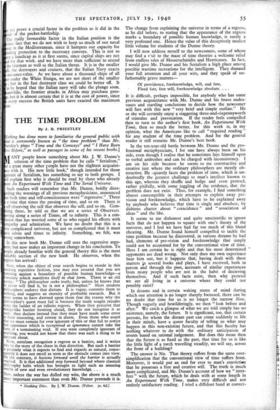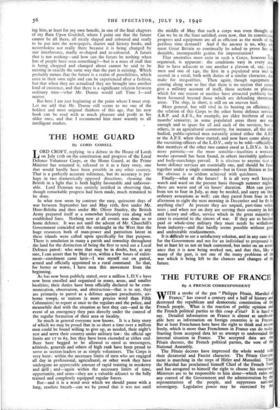THE TIME PROBLEM
By J. B. PRIESTLEY
othing has done more to familiarise the general public with hat is commonly known as " the time problem" than Mr. estley's plays " Time and the Conways" and " I Have Been ere Before," as well as passages in some of his recent books.] ANY people know something about Mr. J. W. Dunne's solution of the time problem that he calls " Serialism," t a great many other people have not the slightest acquaint- e with it. His new little book,* though intended for those orant of Serialism, has something to say to both groups. I '11 explain first why it should be read by those who already ow An Experiment With Time and The Serial Universe.
Such readers will remember that Mr. Dunne, boldly disre- rding the warnings of all previous metaphysicians, announced t both time and self-consciousness were " regressive." There a time that times the passing of time, and so on. There is self observing the self that observes the self, and so on. Com- ming these, he told us that we are a series of Observers oving along a series of Times, off to infinity. This is a con- usion that has worried some of us who regard his efforts with 'mpathy and admiration. We have no doubt that this is a cry complicated universe, but not so complicated that it must .e selves and times to infinity. Something, we felt, was ong somewhere.
In this new book Mr. Dunne still uses the regressive argu- ent, but now makes an important change in his conclusion. To ple already familiar with the general theory this is the most aluable section of the new book. He observes, when the ress has arrived : Now, when the object of your search begins to recede in this ocking repetitive fashion, you may rest assured that you are attering against a boundary of possible human knowledge—a oundary which manifests itself in that form. There is an old ying : " The philosopher seeks truth; but, unless he knows that never will find it, he is not a philosopher." Most modern hilosophers. endorse that dictum. It is vague, commits them to othing, and suggests an eternity of profitable research. But it ever seems to have dawned upon them that the reason why the hilosopher's quest must fail is because the truth sought recedes ong the ladder of an infinite regress. When they perceive that ge-like barrier looming ahead, they do not recognise it as uch: they declare instead that they must have made some error their reasoning, and retreat in alarm. Even those who assert t we must remain for ever ignorant of this or that fail to notice t Ignorance which is recognised as ignorance cannot take the orm of a terminating void. If you were completely ignorant of riling, you would not know that there was such a thing to be orant about.
Now, serialism recognises a regress as a barrier, and it writes s to the story of the chase in that direction. But such a barrier Precisely what it expects to find and regards as natural, conse- uently it does not recoil as soon as the obstacle comes into view. the contrary, it hastens forward until the barrier is actually eached. It is that additional step forward beyond where classical hliosophy halts which has brought to light such an amazing ealth of new and even revolutionary knowledge. ..
ow, unless the war has dulled my wits, the above is a much Ore important statement than even Mr. Dunne pretends it is.
* Nothing Dies. By J. W. Dunne (Faber. 35. 6d.)
The change from explaining the universe in terms of a regress, as he did before, to stating that the appearance of the regress marks a boundary of possible human knowledge, is surely a very profound one. Hence the value of this deceptively modest little volume for students of the Dunne theory.
I will now address myself to the newcomers, some of whom may find a visit to the maze of time theories a welcome relief from endless tales of Messerschmidts and Hurricanes. In fact, I would give Mr. Dunne and his Serialism a high place among possible wartime recreations for the intelligent. They demand your full attention and all your wits, and they speak of un- fathomably grave matters—
Of providence, foreknowledge, will, and fate, Fixed fate, free will, foreknowledge absolute. . . .
It is difficult, perhaps impossible, for anybody who has some previous acquaintance with Mr. Dunne and his brave endea- vours and startling conclusions to decide how the newcomer will fare with this new " very brief and simple outline." He or she will certainly enjoy a staggering three-and-sixpennyworth of stimulus and provocation. If the reader feels compelled then to turn to the author's first book, An Experiment With Time, then so much the better, for this work is, in my opinion, what the Americans like to call " required reading " for any student of the time problem. And for the general reader it still remains Mr. Dunne's best book.
In the ten-year-old battle between Mr. Dunne and the pro- fessional metaphysicians, I for one have always been on his side, even though I realise that he sometimes lays himself open to verbal ambushes and can be charged with inconsistency. I am on his side because he seems to me constructive and creative just where the ordinary philosophers are merely ob- structive. He :quarely faces the problem of time, which is un- doubtedly the greatest challenge to man's intellect known to this age, whereas they shuffle and hedge and even pretend, rather pitifully, with some juggling of the evidence, that the problem does not exist. Thus, for example, I find something almost contemptible in their attempts to explain away pre- vision and foreknowledge, which have to be explained away by anybody who believes that time is single and absolute, by dubious chatter about " coincidence " and " association of ideas " and the like.
It seems to me dishonest and quite unscientific to ignore facts that do not happen to square with one's theory of the universe, and I feel we have had far too much of this bland cheating. Mr. Dunne found himself compelled to tackle the time problem because he discovered, in various dreams he had had, elements of pre-vision and foreknowledge that simply could not be accounted for by the conventional view of time. Here I am certain he is right and that his most determined ' opponents are dead wrong. Not only does my own experience bear him out, but it happens that, having dealt with these matters n several books and plays, I have received, both in person and through the post, accounts of similar experiences from many people who are not in the habit of decieving themselves. And if such facts exist, then why pretend we are all living in a universe where they could not possibly exist?
In dreams and in certain waking states of mind during which our attention is no longer sharply focussed, there can be no doubt that time for us is no longer the narrow Now.
Though vaguely and bewilderingly, we then " look before and after." We catch a glimpse of what we are told simply has no existence, namely, the future. It is significant, too, that certain persons, for whom the distant past can come suddenly to life in their minds, have a queer faculty of telling us what may happen in this non-existent future, and that this faculty has nothing whatever to do with the ordinary anticipation of events based on rational judgement. But does this mean then that the future is as fixed as the past, that time for us is like the little light of a torch travelling steadily, we will say, across the front of a building?
The answer is No. That theory suffers from the same over- simplification that the conventional view of time suffers from. Moreover, it would put an end for ever to man's conviction that he possesses a free and creative will. The truth is much more complicated, and Mr. Dunne's account of how we " inter- fere " with the future, which he deals with at some length in An Experiment With Time, makes very difficult and not entirely satisfactory reading. I tried a diffident hand at correct- ing him, at least for my own benefit, in one of the final chapters of my Rain Upon Godshill, where I point out that the future cannot be all there, all nicely shaped and coloured and ready to be put into the newspapers, diaries and history books, and nevertheless not really there because it is being changed by our interference, madly re-shaped and re-coloured. A future that is not nothing—and how can the future be nothing when lots of people have seen something?—but is a mass of stuff that is being chopped and changed about cannot be said to be existing in exactly the same way that the past is existing. Which probably means that the future is a realm of possibilities, which exist in their own right and can be experienced after a fashion, but that when they are actualised they are brought into another kind of existence, and that there is a significant relation between ordinary time—what Mr. Dunne would call Time I—and matter.
But here I am just beginning at the point where I must stop. Let me add that Mr. Dunne still seems to me one of the boldest and most original thinkers of this age, that his new book can be read with as much pleasure and profit as his older ones, and that I recommend him most warmly to all intelligent readers.



































 Previous page
Previous page